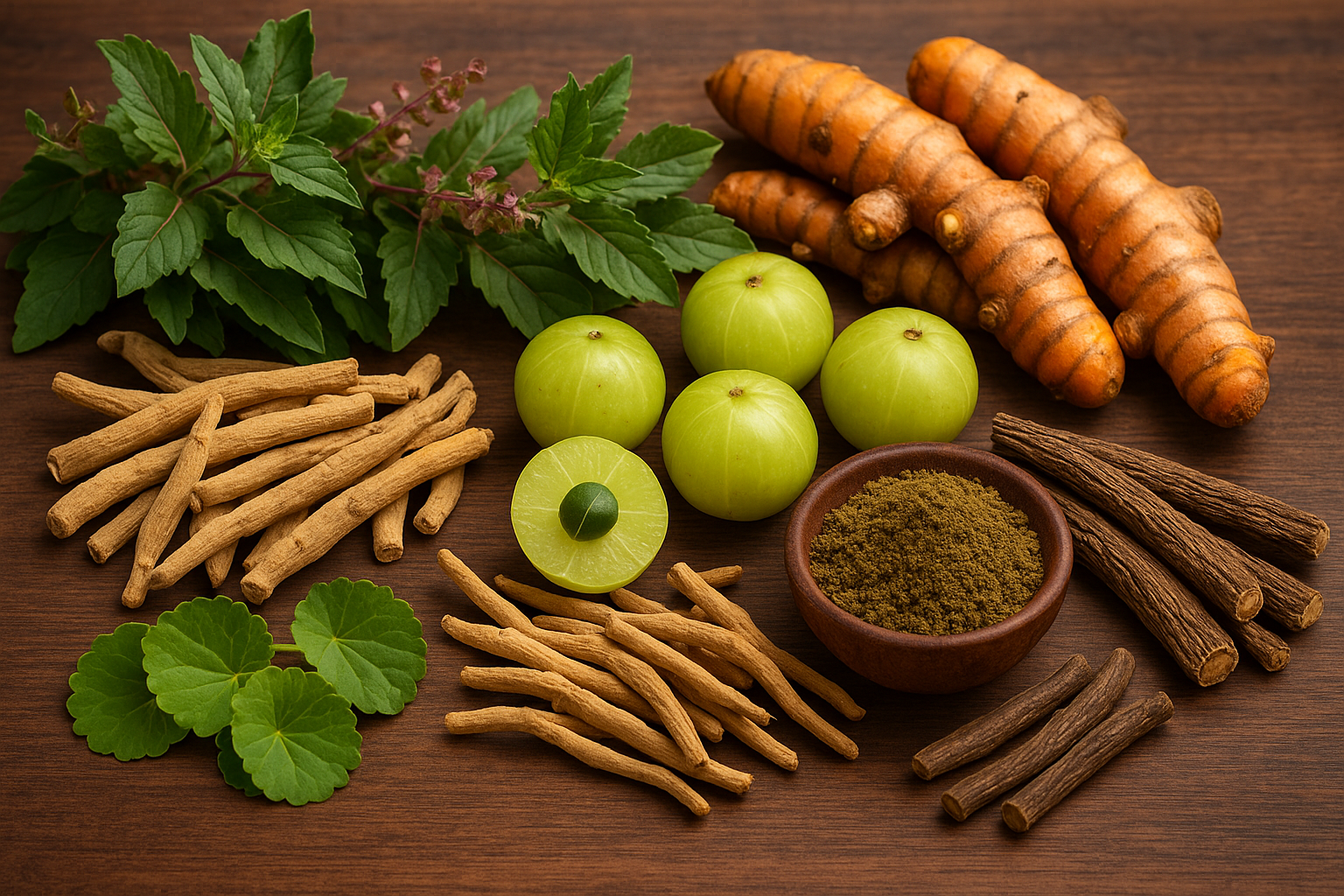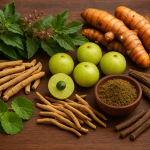The ancient Indian medical system known as Ayurveda is becoming more and more well-known throughout the world for its all-natural and comprehensive approach to health and wellbeing. Powerful herbs that have been used for centuries to balance the body, mind, and spirit are at the core of Ayurveda. These herbs are lifestyle enhancers as well as remedies. This comprehensive guide will examine 15 Ayurvedic herbs that have the potential to significantly transform your life, supported by their advantages, applications, and contemporary significance.
- Ashwagandha (Withania somnifera)
What It Is:
Ashwagandha, often referred to as Indian Ginseng, is a powerful adaptogen known for its ability to reduce stress and anxiety.
Benefits:
- Reduces cortisol levels
- Enhances stamina and strength
- Improves sleep quality
- Boosts testosterone and fertility in men
How to Use:
Take 1 teaspoon of Ashwagandha powder with warm milk before bed. Capsules and tablets are also widely available.
- Tulsi (Ocimum sanctum)
What It Is:
Also known as Holy Basil, Tulsi is revered in Indian households as a sacred plant.
Benefits:
- Strengthens immunity
- Fights respiratory disorders
- Reduces stress and anxiety
- Detoxifies the body
How to Use:
Boil fresh Tulsi leaves in water to make a herbal tea. You can also consume Tulsi drops or capsules.
- Turmeric (Curcuma longa)
What It Is:
A golden spice known for its powerful anti-inflammatory and antioxidant properties.
Benefits:
- Reduces inflammation
- Fights infections
- Improves skin health
- Supports joint function
How to Use:
Mix 1/2 tsp turmeric powder in warm milk. Add a pinch of black pepper to enhance absorption.
- Triphala
What It Is:
A traditional herbal blend of three fruits: Amalaki, Bibhitaki, and Haritaki.
Benefits:
- Improves digestion
- Acts as a mild laxative
- Detoxifies the body
- Enhances eye health
How to Use:
Take 1 tsp Triphala powder with warm water before bed. Tablets are also available.
- Shatavari (Asparagus racemosus)
What It Is:
Known as the “Queen of Herbs,” Shatavari is especially beneficial for women.
Benefits:
- Balances hormones
- Supports lactation
- Relieves PMS and menopause symptoms
- Enhances fertility
How to Use:
Mix 1 tsp of Shatavari powder in warm milk or take it in capsule form.
- Brahmi (Bacopa monnieri)
What It Is:
A brain-boosting herb widely used in Ayurvedic nootropic formulas.
Benefits:
- Enhances memory and focus
- Reduces anxiety and stress
- Supports cognitive function
- Promotes restful sleep
How to Use:
Consume Brahmi tea or take capsules/tablets daily.
- Arjuna (Terminalia arjuna)
What It Is:
A heart-friendly herb made from the bark of the Arjuna tree.
Benefits:
- Supports cardiovascular health
- Regulates blood pressure
- Strengthens heart muscles
How to Use:
Boil Arjuna bark powder in water to make tea, or take it as a supplement.
- Gotu Kola (Centella asiatica)
What It Is:
An herb known for rejuvenating brain function and enhancing mental clarity.
Benefits:
- Boosts concentration and memory
- Supports skin healing
- Reduces anxiety and fatigue
How to Use:
Drink Gotu Kola tea or use its extract in capsule form.
- Neem (Azadirachta indica)
What It Is:
A bitter herb used for detoxification and skin purification.
Benefits:
- Purifies the blood
- Clears acne and skin infections
- Supports liver health
- Acts as a natural pesticide
How to Use:
Consume Neem capsules or drink Neem water. It can also be applied externally as a paste.
- Guduchi (Tinospora cordifolia)
What It Is:
Also known as Giloy, Guduchi is an immunity-boosting herb.
Benefits:
- Strengthens the immune system
- Reduces fever and chronic fatigue
- Detoxifies the liver
How to Use:
Drink Guduchi juice with water or take in tablet form.
- Mulethi (Glycyrrhiza glabra)
What It Is:
Also called Licorice Root, this sweet-tasting herb has multiple benefits.
Benefits:
- Soothes sore throat
- Improves digestion
- Reduces ulcers
How to Use:
Boil Mulethi sticks in water to make tea or consume it in powdered form.
- Amla (Emblica officinalis)
What It Is:
Also known as Indian Gooseberry, Amla is rich in Vitamin C and antioxidants.
Benefits:
- Strengthens immunity
- Improves skin texture
- Enhances hair growth
- Aids digestion
How to Use:
Eat raw Amla, drink its juice, or take it in powder/tablet form.
- Guggul (Commiphora mukul)
What It Is:
A resin extracted from the Guggul tree, used in weight loss and detox treatments.
Benefits:
- Supports fat metabolism
- Lowers cholesterol
- Eases joint pain
How to Use:
Guggul is usually taken in tablet form under medical guidance.
- Jatamansi (Nardostachys jatamansi)
What It Is:
A calming herb used for stress relief and better sleep.
Benefits:
- Reduces anxiety and insomnia
- Improves mental clarity
- Promotes emotional balance
How to Use:
Use Jatamansi oil for massage or take it in capsule form.
- Kalmegh (Andrographis paniculata)
What It Is:
A bitter herb traditionally used to support liver function and immunity.
Benefits:
- Detoxifies the liver
- Fights infections
- Boosts immunity
How to Use:
Consume Kalmegh juice or capsules as directed.
Final Thoughts
Ayurvedic herbs are not just supplements—they are natural allies for a healthier, more balanced life. Whether you’re dealing with stress, low immunity, poor digestion, or skin issues, these herbs can offer safe and effective support.
Start slowly, choose herbs based on your current health needs, and consult a healthcare provider or Ayurvedic practitioner for personalized guidance.
Nature has solutions for many of our modern problems—you just have to know where to look. And in the case of Ayurveda, the answers have been waiting for you for over 5,000 years.
Disclaimer: Always consult your doctor before starting any new supplement or herb, especially if you are pregnant, nursing, or on medication.










